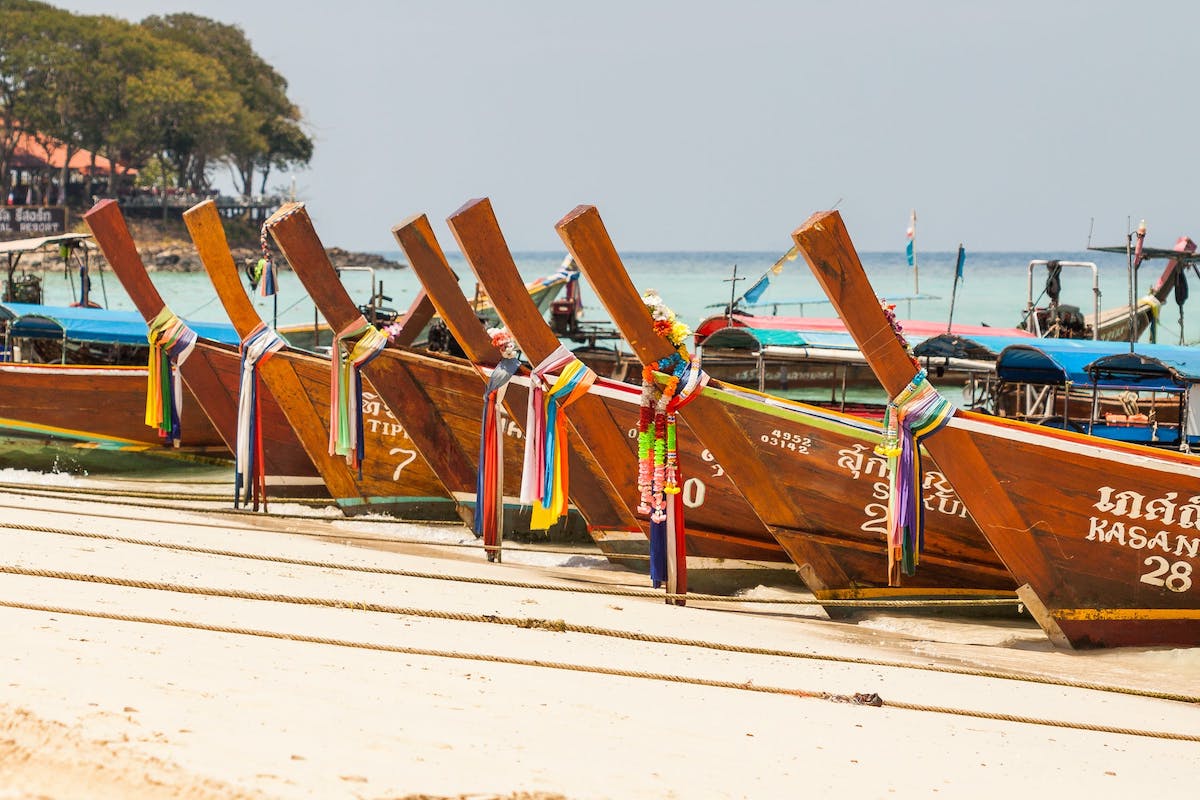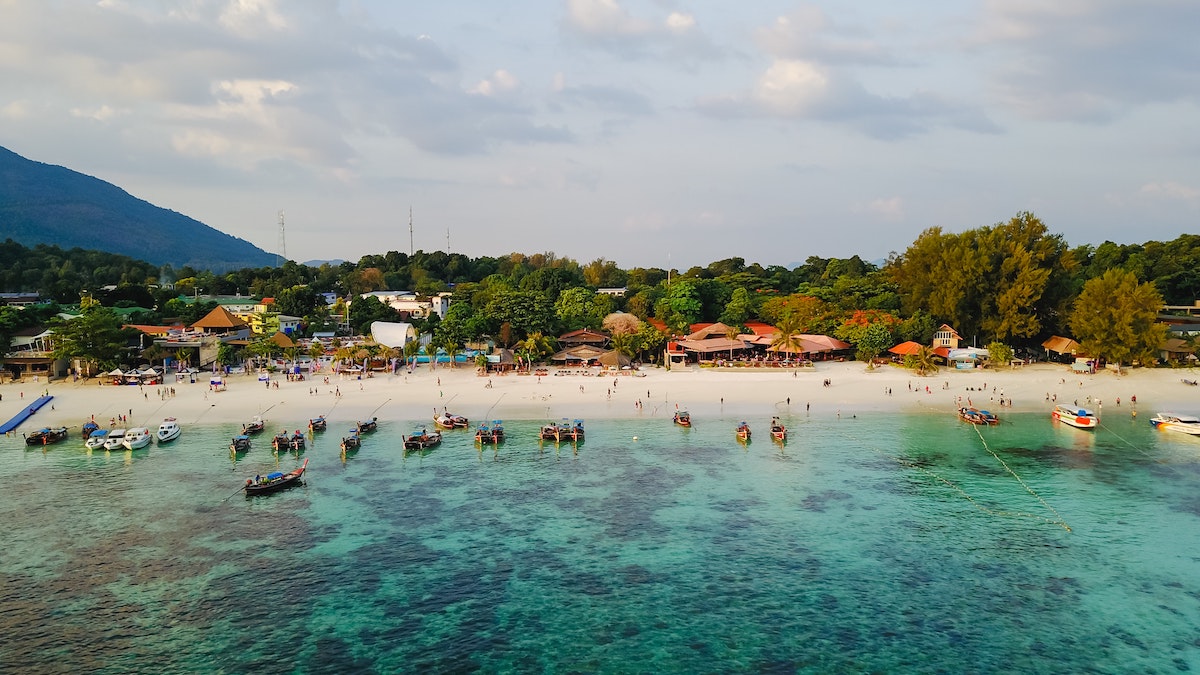
The Ultimate Guide to Thailand Visas for Digital Nomads & Expats
By: Nahla ElKazak / Sarah Stone
Skip to Section
Article Summary
Thailand’s visa options read like a menu at your favorite restaurant – there’s something for everyone, from weekend warriors to permanent residents.
This guide breaks down every visa Thailand offers, covering tourist visas (now 60 days for US citizens!), the SMART visa for tech professionals, the Privilege visa for high-net-worth individuals, the new 10-year digital nomad visa, retirement options, and even permanent residency. You’ll learn the requirements, costs, and application processes for each visa type, plus insider tips on which option fits your travel style and budget.
- US citizens now get 60 days visa-free (extendable to 90 days), while the new digital nomad visa offers 10 years for remote workers earning $80K+.
- SMART visas target specific industries with 4-year stays and work permit exemptions, while Privilege visas offer 5-20 year options with VIP perks.
- Retirement visas come in 1-year and 10-year flavors, requiring 800K-3M Baht in the bank and mandatory health insurance.
- Work permits require a Non-Immigrant B visa first, and freelancers face extra hurdles since there’s no official freelancer category.
- Permanent residency is limited to 100 spots per nationality annually and requires 3+ years on a non-immigrant visa.
Thailand draws us in with its gorgeous beaches, bustling cities, exciting jungles, historic landmarks, delicious food, amazing people…the list goes on. And its foreigner-friendly visa application procedures make it easy to understand why Thailand is at the top of so many expats’ lists. If you’re planning a short stay, a longer visit, or even to live and work—or retire—in Thailand, this guide is here to help.
Read on to learn more about different types of residences in Thailand for long-term travelers, digital nomads, semi-retired travelers and retirees, and more! Be sure to use the table of contents above if you’d like to skip around to different visa types.

Photo by Miro Alt
Tourism and Temporary Residence in Thailand
Thailand has worked hard to position the country as an attractive destination for foreign investors, entrepreneurs, and highly skilled foreigners. The government has therefore introduced new residence visa schemes with the goal to attract more talented people into Thailand—and not just tourists.
Thailand has a relatively large pool of visa options. Thailand visa holders are classified into four broad categories: Tourist Visa, Privilege Entry (Privilege) Visa, SMART Visa, and non-immigrant visas. Let’s look at each of these categories in detail.
Thailand Tourist Visa Options
Thailand Tourist Visa Exempt Entry
US nationals and those of some other countries are not required to obtain a tourist visa before you arrive in Thailand, depending on how long you’re staying. If you’re a US Citizen, then you can travel in Thailand for up to 60 days without a pre-approved tourist visa. You’ll also need your passport (valid at least six months after arrival in-country) and an airline ticket showing that you will be leaving the country before your 60 days are up. All travelers must complete a Digital Arrival Card within 72 hours of arrival.
Extending Your Stay While In Thailand
When you enter Thailand, you’re allowed an initial stay of 60 days. If you are already in Thailand on your 60-day stay but you’d like to remain in the country a bit longer, you can extend for an extra 30 days for 1,900 Baht at the Thai Immigration Bureau Office.
Thailand Tourist Visa
If you know you’d like to stay in Thailand for longer than 90 days before you arrive in-country, you can apply for a tourist visa, which allows an initial stay of up to 60 days with an extension of 30 days. If you wish to extend your stay for more than that, you have to convert your tourist status to non-immigrant status. You can apply for this visa at the Thai Embassy or at a Thai Consulate in the United States before traveling.
Once you’re in Thailand, you may have the opportunity to extend your stay for an additional 30 days, for a fee of 1,900 Baht. As with the visa-exempt entry option, you’ll need a valid passport that won’t expire for at least six months after in-country arrival, and an airline ticket showing return or onward travel. All travelers must complete a Digital Arrival Card within 72 hours of arrival.

Photo by Thunyarat Klaiklang
Thailand SMART Visa
The Thailand SMART Visa program was introduced in 2018 to attract highly-skilled workers and investors working in specific industries. The SMART Visa holder is granted up to four years in residence and a work permit exemption.
This is different from the Thailand Digital Nomad Visa in that the SMART Visa has different application procedures and allows you to stay in Thailand for up to four years, while the new Digital Nomad Visa allows you to stay up to 10 years with different requirements.
Note: There’s been buzz about changes to the SMART visa program proposed in January 2025 that may affect available categories – before setting your heart on a Thailand SMART visa, verify current status with official sources.
Thailand SMART Visa Categories
The Thailand SMART Visa program includes five categories:
- Talent
- Investor
- Executive
- Startup entrepreneur
- Spouse and legitimate children of SMART Visa holders
We’ll look at the individual requirements for applying to Thailand’s SMART Visa program, but in general, you’ll need to put together some application materials for any category, including:
- The appropriate visa application for the SMART Visa category for which you’re applying
- A copy of your passport
- A notarized and clear criminal record issued by the police authorities in your country
- A medical certificate declaring that you have no prohibitive diseases outlined by the Thai government—the certificate must be notarized and the issuance date has to be no longer than three months prior to application
- Depending on the visa, copies of your academic certificates and anything else that proves your expertise in your field—this can be recommendations, publications, or research projects and awards
- Proof of previous employment (if applicable)
- If you’re not submitting the application yourself, then you’ll need to include a power of attorney
Let’s take a closer look at the SMART Visa Categories.
Thailand SMART T (Talent) Visa
The Thailand SMART Talent Visa is for high-level professionals in specific industries related to science and technology. This is a maximum four-year renewable visa, and no re-entry permit is required. Your spouse and children are also granted permission to stay as long as you’re in Thailand, and your spouse can work with no prior permit required. Your 90-day reporting to Immigration is extended to one year on this visa, and as a bonus, you can fast-track service at certain international airports in Thailand.
You must meet the following criteria to receive a Thailand SMART Talent Visa:
- You have to have a minimum income of no less than 100,000 Baht/month. If you’re an expert with an employment contract with a startup, or if you’re a retired expert with an endorsement from a relevant organization, your income must be no less than 50,000 Baht/month.
- An employment or service contract with a Thai entity that works in one of the country’s targeted industries. The contract must be valid for at least an additional year from the date of your application.
You can find the detailed requirements for the SMART Talent visa here.
You can also find the complete list of documents required for the talent visa here.
Thailand SMART I (Investor) Visa
The Thailand SMART Investor visa is for investors who are willing to invest in the targeted industries in Thailand. This is a maximum four-year renewable visa, and no re-entry permit is required. Your spouse and children are also granted permission to stay as long as you’re in Thailand, and your spouse can work with no prior permit required. Your 90-day reporting to Immigration is extended to one year on this visa, and as a bonus, you can fast-track service at certain international airports in Thailand.
You must meet the following criteria to receive a Thailand SMART Investment Visa:
- Direct investment in a Thai company, either individually or via VC, for at least 20 million Baht
- Direct investment in a company endorsed by relevant Thai agencies as an incubator or accelerator, for at least 5 million Baht
You can find detailed requirements for the SMART investor visa here.
You can also find the complete list of documents required for the investor visa here.
Thailand SMART E (Executive) Visa
The SMART Executive visa is for foreigners who are executives in technology-based companies in one or more of Thailand’s targeted industries. This is a maximum four-year renewable visa, and no re-entry permit is required. Your spouse and children are also granted permission to stay as long as you’re in Thailand, and your spouse can work with no prior permit required. Your 90-day reporting to Immigration is extended to one year on this visa, and as a bonus, you can fast-track service at certain international airports in Thailand.
To qualify, you need to:
- Have a minimum income of at least 200,000 Baht/month
- Hold a Bachelor’s or higher with a minimum of 10-year work experience in relevant field
- Hold a senior management role within your organization
- Have an employment or service contract with a Thai entity that works in one of the country’s targeted industries. The contract must be valid for at least an additional year from the date of your application.
You can find the detailed requirements for the SMART Executive visa here.
The complete list of documents for the executive visa can be found here.
Thailand SMART S (Startup) Visa
The Thailand Startup Visa is for foreign entrepreneurs who want to start a business in Thailand’s targeted industries. This is a maximum two-year renewable visa, and no re-entry permit is required. Your spouse and children are also granted permission to stay as long as you’re in Thailand, and your spouse can work with no prior permit required. Your 90-day reporting to Immigration is extended to one year on this visa, and as a bonus, you can fast-track service at certain international airports in Thailand. If you change your job while working in Thailand under this visa, you’ll need to report additional endorsements from a qualifying entity.
To qualify for a SMART Startup Visa, you have to:
- Establish a startup in Thailand certified as a targeted industry by the government
- Hold a minimum of 25% of the company’s capital, or hold the director position of that company
- Deposit at least 600,000 Baht in a Thai bank—and you must have held that bank account for at least three months prior to deposit
- If you’re bringing a spouse or children, you’ll need to make an additional deposit of at least 180,000 Baht per person in a Thai bank account that you’ve held for at least three months prior to deposit
- Provide proof of health insurance that covers your entire stay for you and any accompanying family members
You can find more details about the Thailand SMART Startup visa here.
The complete list of documents for the startup visa can be found here.
Thailand SMART O (Other) Visa
The SMART Other Visa category is for the spouse and children of a SMART Visa holder. Under this category, you as the spouse of a SMART Visa holder can work in Thailand without a work permit. Similar in some ways to the other SMART Visa types, there’s no re-entry permit required, 90-day reporting to Immigration is extended to one year, and can there’s fast-track service at certain international airports in Thailand. As well, you and your children can stay and work in Thailand with no work permit needed by a Thai company. If your SMART Visa holder spouse happens to change their job, you’ll need to get additional endorsements from qualifying entities.
To qualify for a SMART Other Visa, you have to:
- Be a legal dependent of a SMART Visa holder type T, I, E, or S—in this case, both spouses and children qualify as dependents
- As the child of a SMART Visa holder, be under 20 years old (although there are exceptions for children of SMART “T” visa holders)
- For spouses and children of SMART “S” Visa holders specifically: Hold an amount of deposit by your SMART Visa sponsor of at least 180,000 Bahtper person to a Thai bank account that has existed for at least three months prior to deposit
- For spouses and children of SMART “S” Visa holders specifically: Have proof of health insurance for the entire family that covers the period of your stay
You can find more details about the Thailand SMART “Other” Visa here.
The complete list of documents for the “Other” Visa can be found here.

Photo by Tirachard Kumtanom
Thailand Privilege Visa
The Thailand Privilege visa program is designed to attract global high-net-worth individuals who want to live in Thailand. As a Thailand Privilege Card member, you’ll be able to stay in-country as a resident, uninterrupted, for up to 5, 10, or 20 years depending on the program you sign up for. A few benefits you’ll get (depending on the membership you opt into) include:
- Options to upgrade to higher-level programs
- Immigration service and assistance with official needs like opening a bank account, obtaining a driver’s license, etc.
- Expedited immigration and passport control processing
- Airport lounge access
- VIP greeting and escort through airports
- Complimentary short-haul limo transfer 24 times per calendar year from international flights to your hotel or home (available only in certain locations)
- 10 t0 24 complimentary spa treatments per calendar year
- 10 to 24 complimentary 18-hole golf rounds per calendar year
- Unlimited BOGO movie tickets
- Complimentary annual hospital checkup
To qualify for the Thailand Privilege Visa, you must have a foreign passport, have no overstay record in Thailand, have no record of imprisonment, have never declared bankruptcy, and have never been declared a person of unsound mind.
Thailand Privilege Visa Packages and Costs
In this section, we will discuss the different packages the Thailand Privilege Visa program offers.
Thailand 5-Year Privilege Visa, Bronze
Valid for five years, costs 650,000 THB or 19,000 USD.
Thailand 5-Year Privilege Visa, Gold
Valid for five years, costs 900,000 THB or about $24,800 USD.
Thailand 10-Year Privilege Visa, Platinum
Valid for 10 years, costs 1.5m THB or about $41,000 USD.
Thailand 15-Year Privilege Visa, Diamond
Valid for 15 years, costs 2.5m THB or about $69,000 USD.
Thailand 20-Year Privilege Visa, Reserve
Valid for 20 years, costs 5m THB or about $138,000 USD.
Thailand Privilege Visa Application Process and Forms
Once you’ve decided which Thailand Privilege Visa package is best for your interests, you’ll need to fill out and send the relevant visa application form along with a copy of your passport and a personal photo.
The process can take one to three months. Once you’ve passed the background check and your application has been approved, you’ll receive detailed bank transfer instructions. The amount you will transfer will depend on which Thailand Privilege Visa package you’ve chosen. When the bank transfer is complete, you’ll receive your membership card and your visa details.
To apply for the Thailand Privilege Visa program, you’ll need to send copies of the required documents to an authorized agent.

Photo by Florian Wehde on Unsplash
Thailand Digital Nomad Visa / Long Term Resident Visa
While Thailand has always been a paradise for digital nomads, the country has recently launched a Long Term Resident Visa aimed specifically for this demographic of travelers. But there are some restrictions.
In September 2022, Thailand announced a 10-year digital nomad / long term resident visa aimed at attracting highly-skilled foreigners who want to work remotely and live in the country. A bit different from the Thai SMART Visa and with much longer stay than a standard Tourist Visa, the Digital Nomad Visa, or Long Term Resident Visa, exists to bring in remote workers of a certain skill type and income level.
A few benefits of this long-term digital nomad visa include:
- Validity for 10 years (five years at initial application with the option to extend for another five years)
- 90-day report extended to one-year report
- Multiple reentry permits
- Personal tax rate of 17%, compared to 35% for other foreign residents
- Tax emption for overseas income
- Ability to bring your spouse and dependents
Qualifications for the Thailand Digital Nomad Visa / Long Term Resident Visa
There are different restrictions for the Long Term Resident Visa, so we’ll break down the basics.
To qualify for a wealth-based visa, you must:
- Have an annual income of at least $80,000 for the past two years
- Have at least 1 million dollars in assets
- Invest at least $500,000 in Thailand
- Have health insurance coverage (which can include Social Security coverage) for at least $500,000, or a deposit of at least $100,000
If you’re retired and would like to live long-term in Thailand, this is a great option—to qualify, you’ll need:
- Have an annual income of at least $80,000 for the past two years when you apply
- If you aren’t employed currently or if you earn less than the above, then you’ll need to at least invest $250,000 in Thailand government bonds, investment, or property
- Have health insurance coverage (which can include Social Security coverage) for at least $500,000, or a deposit of at least $100,000
If you’re a digital nomad who’s currently employed with a company not based in Thailand, you’ll need:
- Have a bank balance of at least 500,000 THB (about $14,500) continually for the past three months
- To work with a foreign company that either is publicly traded or that’s a private entity with at least $50 million combined revenue in the past three years
- Have health insurance coverage (which can include Social Security coverage) for at least $500,000, or a deposit of at least $100,000
A little different from the more straightforward digital nomad on foreign employment, there’s another option where you can apply as a professional or expert in a specific industry, or work for an institute of higher education or research group within Thailand, or even be employed by the Thai government. In this case, you’ll need:
- If you’re not working for a Thailand government agency—annual income of at least $80,000 for the past two years (though if you earn less than that, but more than $40,000 per year in the past two years, you’ll need a master’s degree in a STEM field of special expertise related to your job)
- At least five years’ experience in your industry, unless you have a PhD within your field
- Have health insurance coverage (which can include Social Security coverage) for at least $500,000, or a deposit of at least $100,000
Get updates about the digital nomad visa here, and see some more details about the application process here.
Thailand Long-Stay Non-Immigrant Visas
Despite the SMART and Privilege visa types being long-stay visas available for Thailand, they’re not categorized as non-immigrant visas. That is, the SMART visa is a category of its own, and the Privilege visa is under the “Privilege Entry” category.
In this section, we will discuss Thailand’s regular non-immigrant visa schemes. The country’s most common non-immigrant visas fall into four categories:
- Study
- Business or work
- Retirement
- To join family in Thailand
Thailand Student Visa
If you plan to study or pursue an internship in Thailand, then you’ll need to obtain a Non-Immigrant Student Visa (NON-ED). This allows a 90-day stay in Thailand, and cost $80 for a single entry, or $200 for multiple entries, and you can apply to extend your stay. It usually takes a week or two to process this visa type. The application is relatively straightforward, and you can learn more about the Thailand Student Visa and application requirements here.
Thailand Business Visa (Employment)
Foreigners who enter Thailand with the intention to work—even as travel bloggers or freelancers—must obtain a work permit. This honestly is a bit of a gray area in that the Thai government didn’t consider online work while developing the rules around visas and work permits, and it can be expensive, time-consuming, and not really worth the red tape to obtain if you’re a self-employed online worker and only planning to stay a month or three.
We don’t explicitly advocate skirting the rules, so let’s talk about the Business Visa, and then how you can get a work permit from there.
To apply for a work permit in Thailand, you first need to apply for a Non-Immigrant Business Visa from your country of residence (you cannot apply for this visa type while in Thailand). Even a volunteer needs a Thai work permit. In addition to the B Visa, there also are Business Approved Visas (B-A) and Investment and Business Visas (IB)—but you’re more likely to need just the Business Visa (B).
You can apply for an initial 90-day Non-Immigrant B visa and choose the “Working” category. Your employer will have to submit an application on your behalf, though if you are a freelancer or otherwise self-employed, there are services that can help walk you through the process of getting a work permit on your own. There is a fair amount of paperwork involved here, and it can be a bit confusing to know what exactly you should submit if you’re a freelancer who’s never had to report things like shareholder lists, business tax information, and so on—so in the case of getting a Thailand Business Visa, you may want to check out services that specialize in navigating the bureaucracy.
With a Thailand Business Visa, you can stay up to 90 days, with the option to extend for one year from your first date of entry into Thailand.
Thailand Work Permit
After you’ve been issued the 90-day Non-Immigrant Business Visa for Thailand, you can start applying for a work permit, which takes about a week to process. If you’re employed by a company either outside of or within Thailand (and not applying as a freelancer or otherwise self-employed), both you and your employer must complete different parts of the application for a work permit. There are restrictions for employers within Thailand for applying for work permits—for example, the types of industries that are allowed (so as not to take jobs away from locals) as well as the number of employees they can get work permits for.
Your employer will need to submit information such as a shareholders list, application for VAT, financial statement, letter of employment with salary information, and more. As an employee, you’ll need to submit some basic information such as passport, signed letter of employment, and working address while in Thailand.
If you’re self-employed, it’s not quite as straightforward. There isn’t a freelancer option for Thailand work permits, and you don’t necessarily want to set up a Thai company, which can be prohibitively expensive (you need to employ at least four Thai citizens per foreigner, for example) and not worth the effort. Many digital nomads, remote workers, semi-retired travelers, and retirees opt to just carry out their work under the radar while in Thailand. You can read some stories and advice here to help figure out what you’d like to do as a digital nomad in Thailand.
As with the Non-Immigrant Business Visa, you may want to work with a service or legal firm that understands the ins and outs of work permit applications for Thailand so that you don’t miss any steps.
Thailand Retirement Visa
Thailand offers two visa options for retirees: a one-year retirement visa (Visa O-A) and a 10-year retirement visa (Visa O-X). Learn more about Thailand Retirement Visas here.
Thailand 1-Year Retirement Visa (NON O-A)
You can apply for a one-year Thailand Retirement Visa if you want to stay in Thailand for more than 180 days—it’s valid for one year, and you can renew annually. As with most other visa types, you must report your residential address every 90 days to your immigration office (by mail or in person) or have a service do this for you.
To be eligible for this visa type, you must:
- Be at least 50 years old as of your application date
- Meet certain financial requirements, such as a security deposit of 800,000 Baht to a Thai bank account, a monthly income of 65,000 Baht, or a combination of the two
- Have no criminal record anywhere
- Obtain Thai health insurance with an annual coverage of at least 40,000 Baht for outpatient treatment and 400,000 Baht for inpatient
- Be free of certain diseases
- Not have any type of employment while in Thailand on this visa
Thailand 10-Year Retirement Visa (NON O-X)
Thailand offers a 10-year retirement visa to nationals of select countries, including the United States, United Kingdom, Canada, and others. This is a five-year visa with the option to extend an additional five years. To qualify, you must:
- Be at least 50 years old as of your application date
- Be from one of the approved countries
- Meet certain financial requirements, such as a security deposit of 3 million Baht to a Thai bank account, or an annual income of 1.2 million Baht
- Obtain Thai health insurance with an annual coverage of at least 40,000 Baht for outpatient treatment and 400,000 Baht for inpatient
- Be free of certain diseases
- Report to Thailand immigration each year
- Not have any type of employment while in Thailand on this visa
Thailand Family Visa (NON-O)
Thailand offers a non-immigrant Family Visa to parents, spouses, and children (under 20, unless unable to support themselves due to mental or physical needs) of Thai nationals or foreigners residing in Thailand. This is not extended to other relationships, such as siblings.
A single entry visa will grant you a three-month stay, while a multiple entry visa will be valid for one year—you can also apply for an extension. Learn more about the Family Visa, including required documents.

Photo by Olivier Darny
Thailand Permanent Residency
If you’re ready to make the lifelong move to Thailand, then Permanent Residency is an option. This opens you to a lot more options and freedoms within Thailand that you wouldn’t have as a non-immigrant visa holder. For example, you don’t have to get a visa extension, you can buy property and get work permits more easily, you can get a high-level position with a Thailand-based company, and more.
It can take about a year from application to approval, and only 100 Permanent Residence offers are given per year to each nationality—so the process can be very competitive.
Your basic qualifications for Thai Permanent Residency are that you must:
- Have spent three consecutive years in Thailand on a non-immigrant visa
- Have a valid work permit spanning three years’ minimum from the date of your application
- Earn 30,000 Baht per month if married to a Thai spouse for at least five years, or 80,000 Baht per month if single
You can apply for permanent residency under four categories:
- Investment
- To qualify for Permanent Residency through investment, you must invest at least 3 million Baht into a Thai company
- Business or work
- You must have had a Thailand Work Visa and Work Permit for at least three years, have worked for your current company for at least one year and can show that you have an Extension of Stay based on your employment, and you must have a monthly salary of at least 80,000 Baht for the past two years, or an annual income of at least 100,000 Baht for the past two years
- Family member of a Thai citizen
- You must be an immediate family member (parent, child, or spouse) of a Thai citizen
- Expert or academic
- To qualify for this option, you must hold a Bachelor’s degree or be employed in your current position for the past three years
- Other categories defined by Thailand Immigration
If you’re interested in citizenship, you’re eligible to apply after having lived as a Permanent Resident in Thailand for five consecutive years.
Thailand visa rules are constantly changing, so make sure to check with the Embassy of Thailand to understand the most current application requirements, costs, and eligibility rules. We will keep updating this post as well with new information!
About the Authors
Nahla ElKazak
Nahla is a freelance writer with a business background that comes from working in the IT industry for over 12 years. She has a BA in English Literature and writes about a variety of topics. When she’s not working on a project, she’s either reading, working out, or hanging out with good company. She often spends her out-of-town time hiking. You can follow her on Twitter and LinkedIn.
.
Sarah Stone
 As the editor-in-chief of Frayed Passport, my goal is to help you build a lifestyle that lets you travel the world whenever you want and however long you want, and not worry about where your next paycheck will come from. I've been to 20+ countries and five continents, lived for years as a full-time digital nomad, and have worked completely remotely since 2015. If you would like to share your story with our community, or partner with Frayed Passport, get in touch with me using the form on our About page.
As the editor-in-chief of Frayed Passport, my goal is to help you build a lifestyle that lets you travel the world whenever you want and however long you want, and not worry about where your next paycheck will come from. I've been to 20+ countries and five continents, lived for years as a full-time digital nomad, and have worked completely remotely since 2015. If you would like to share your story with our community, or partner with Frayed Passport, get in touch with me using the form on our About page.Featured image via Unsplash.
Information published on this website and across our networks can change over time. Stories and recommendations reflect the subjective opinions of our writers. You should consult multiple sources to ensure you have the most current, safe, and correct details for your own research and plans.
Frayed Passport is a participant in the Amazon Associates Program, an affiliate advertising program designed to provide a means for sites to earn advertising fees by advertising and linking to Amazon.com. We also may share links to other affiliates and sponsors in articles across our website.




